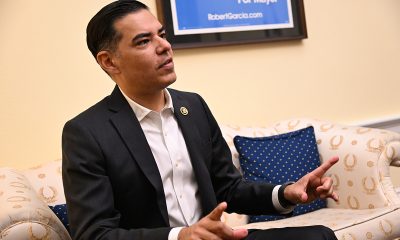News
Kamala Harris wants your vote

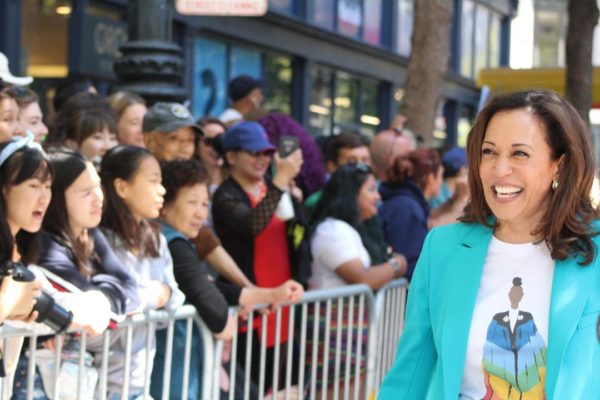
The conflict is internal. It’s a secret struggle, really, that Kamala Harris has been forced to face in public. The Democratic presidential candidate doesn’t like to brag. It’s unbecoming, it’s immodest, it places the individual ahead of the community. Instead, Harris, who was inculcated in the spirit of the 1960s civil rights and social and economic justice movements, profoundly believes in community and coalition building.
“That’s exactly how I was raised,” Harris tells the Los Angeles Blade in a June 18 phone interview. “It’s not about you. It’s about getting the job done.”
The job done of winning the presidency means not taking any group or voter for granted, including the LGBT community. Harris’ struggle to tout her own achievements, which she discusses in her memoir The Truths We Hold: An American Journey, stands in sharp contrast to the man she intends to defeat, Donald Trump, the biggest chest-pounding, klieg lights-seeking braggadocio con artist the world has seen in decades. Harris, a former district attorney and California attorney general who believes Trump is a racist, thinks the House should launch impeachment proceedings into the president’s illegal behavior. She also thinks Trump should be prosecuted after he leaves office.
Some wonder if Harris is “tough enough” to go up against Trump. They need only look at her precision prosecution of Attorney General Jefferson Beauregard Sessions during a Senate Intelligence Committee hearing. Despite being interrupted by her Republican colleagues, Harris forced the flabbergasted Sessions to throw his hands in the air. “I’m not able to be rushed this fast!” Sessions said, as if needing a fan and mint julep. “It makes me nervous.”
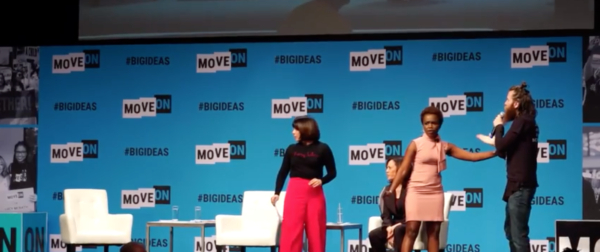
Or juxtapose a visibly frightened Trump crouching behind a lectern during a disturbance at a rally before four burly men rushed to his rescue—to Harris who was initially surprised but sat calmly when a white man rushed the stage, grabbed her microphone and had only black lesbian MoveOn.org communications director Karine Jean-Pierre for protection.
Harris calmly walked off the stage, smiling, while the man was hustled away. She then calmly returned to deliver her talk about pay equity. No one talks about the courage it takes for Harris to stand alone onstage, despite what one presumes is an ongoing avalanche of death threats from Trump supporters.
The field of 23 Democratic presidential contenders is expected to narrow after the June 26-27 debates. But while Harris is top-tier, she is not a shoo-in for the nomination, which is still a long ways away.
“I hate to say this—but we need a man. Nothing against her. I’m sure she’s smart and great. But I’m going with Joe Biden. He’s got thick skin and he’s the only one who can beat Trump,” one white gay man tells the Los Angeles Blade on background.
Biden’s “thick skin” is now under scrutiny. Though he had been advised against it, on Juneteenth, the former vice president cited working with notorious racist segregationist senators James Eastland (a Mississippi plantation owner who believed integration would lead to “”mongrelization”) and Herman Talmadge (who as Georgia governor closed schools rather than desegregate) as an example of civility and bipartisanship.
New Jersey Sen. Cory Booker, an African American presidential candidate, was offended and said Biden should apologize. Biden took umbrage and pushed back. “Cory should apologize,” Biden told reporters. “He knows better. There’s not a racist bone in my body; I’ve been involved in civil rights my whole career. Period. Period. Period.”
Harris said Biden’s remarks concerned her “deeply. If those men had their way, I wouldn’t be in the United States Senate and on this elevator right now,” she told Capitol Hill reporters.
It is unclear if Biden, the frontrunner in the race for the Democratic presidential nomination, will lose support as some younger progressive politicos claim he is “out of touch” with current sensibilities around race, while older politicos try to explain his gaffe.
Several younger LGBT voters support South Bend, Ind. Mayor Pete Buttigieg, who smartly talks about the future. They think Buttigieg, a vet who served in Afghanistan, can take down the bully Trump and shame him for ducking the Vietnam War. Buttigieg has stepped off the campaign trail to deal with the shooting of a black man by a while police officer in South Bend, which has resurrected past racial complaints over a housing policy. But Buttigieg will be standing next to Biden during the second Democratic debate on June 27, a visual that screams generational divide.
Harris will be standing next to Vermont Sen. Bernie Sanders and New York Sen. Kirsten Gillibrand.
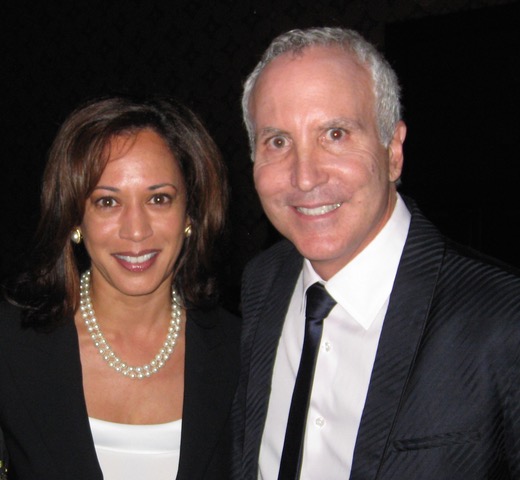
California Attorney General candidate Kamala Harris with Equality California Executive Director Geoff Kors at an EQCA event (Photo by Karen Ocamb)
Harris will have a strong LGBT cheering section glued to TVs across California, including longtime friend Mark Leno, the first openly gay man elected to the State Senate who brought Harris to her first Human Rights Campaign gala in 1999 and Palm Springs City Councilmember Geoff Kors who, as executive director of Equality California, first introduced Harris to the broader LGBT community when she was the San Francisco DA running for attorney general.
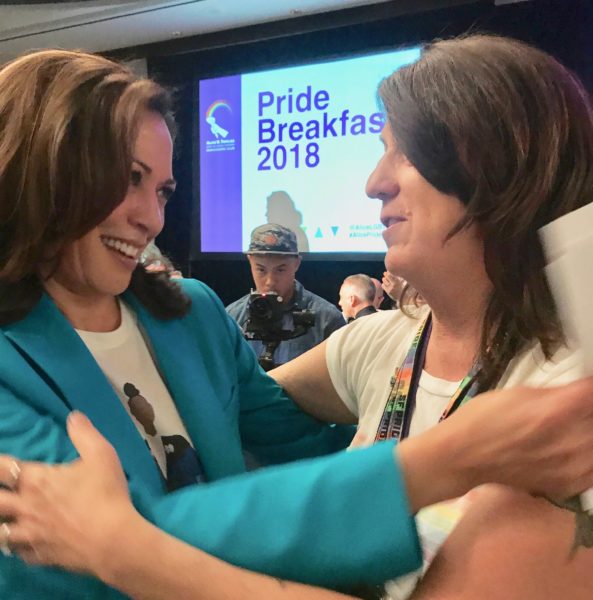
Sen. Kamala Harris and Kate Kendell, Campaign Manager for
Take Back the Court, at a Pride event (Photo courtesy Kendell)
Kors and Kate Kendell, former executive director of the National Center for Lesbian Rights, also worked closely with Harris when San Francisco Mayor Gavin Newsom decided to issue marriage licenses to same sex couples in 2004 and Harris was recruited to officiate at City Hall. They teamed up again to fight the anti-gay marriage Prop 8, which her 2010 opponent, Republican LA DA Steve Cooley supported.
Kris Perry, former plaintiff in the federal lawsuit against Prop 8, whose wedding to Sandy Stier Harris officiated when Prop 8 was defeated, tells the Los Angeles Blade she supports Harris “100%.” Perry’s son Spencer works on Harris’ presidential campaign.
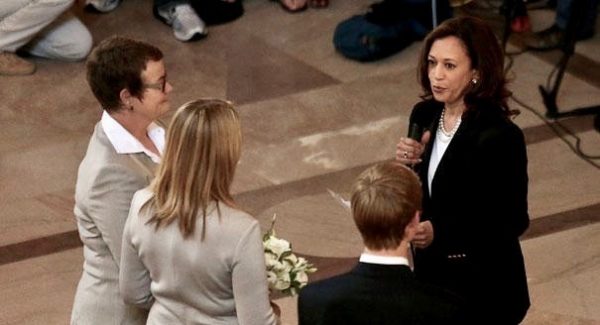
Attorney General Harris officiating at the wedding of Kris Perry and Sandy Stier, with Elliot Perry looking on. (Photo courtesy Perry)
The documentary “The Case Against 8” shows the wedding and the moments before when fellow Prop 8 plaintiffs Paul Katami and Jeff Zarrillo in LA are being told to “step aside” to let straight couples get their licenses since the Los Angeles County Registrar/Clerk’s had not yet received official word from the state to go ahead after the Supreme Court decision. The couple is stunned but their legal team gets Harris on the phone—she’s celebrating with Perry & Stier, Chad Griffin, Cleve Jones and others in San Francisco—and Harris directs Clerk Dean Logan to start the marriages now. She tells him to “enjoy it.” Logan says he will—he’s a strong LGBT ally.
Interestingly, Harris confirms that she intentionally uses the couple in her book as an example of finding the commonality in people. In the chapter “Wedding Bells,” she talks about Prop 8 and officiating at their wedding—and then, in the same chapter, she talks about meeting, falling in love with and marrying white California attorney Doug Emhoff, who brings to the interracial marriage two adult step-children. Thought there is no blaring neon light signaling her intention, Harris uses her own personal story and a public exercise of her office to illustrate that a straight inter-racial couple and a lesbian couple, both with children folded into a blended family, have the experience of love in common.
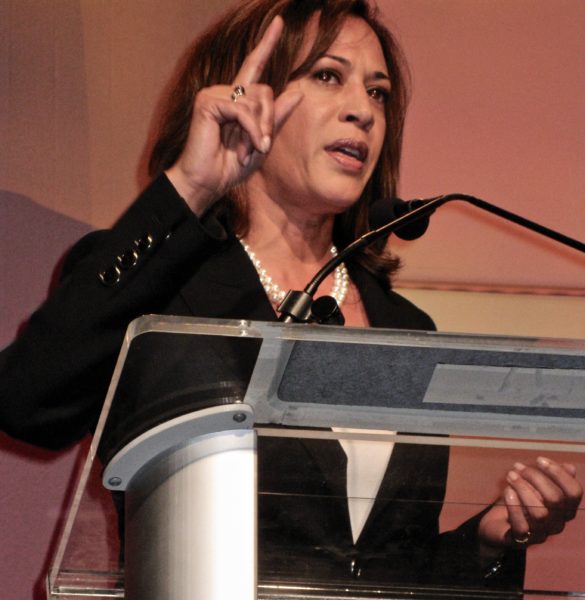
Attorney General Harris at Equality California event (Photo by Karen Ocamb)
Indeed, while Harris works at finding commonality and building coalitions, she is herself the walking positive personification of intersectionality and an example of why identity politics still serve to combat invisibility and under-representation.
Her brilliant parents immigrated from Jamaica and India. She fought hard to become the first female, the first black and the first Asian-American district attorney in San Francisco. Then she fought to become California’s first female, black, and Asian-American attorney general. She then the second black woman in U.S. history to win a Senate seat.
“I grew up exposed to many cultures, and it certainly did teach me from birth about the fact that people have so much more in common than what separates them,” Harris tells the Los Angeles Blade. “I didn’t have to learn it from reading about it. I didn’t know the word ‘intersectionality’ but I’ve always known the commonality between people. A mother’s love for her child, a parent’s desire for their family to be healthy and safe. These are universal truths, regardless of the last name and how you spell it, or what your grandmother’s language is, or the God you pray to. That’s how I’ve always lived my life, which is knowing the commonality between people.”
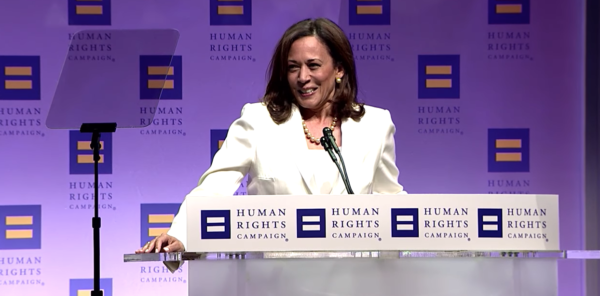
It was a point she made in her Oct. 31, 2017 keynote HRC address in Washington DC.:
“I believe this is a moment when our country is witnessing an assault on our deepest values and ideals. Where people don’t trust our government, its institutions, or leaders.
So to restore that trust, HRC I believe we must speak truth.
Even when it makes people uncomfortable.
Even when others are silent.
And as the poet Audre Lorde reminds us, “there are so many silences to be broken.”
So let’s speak truth. From Charlotte to Charlottesville, we have been reminded racism in this country is real.
Sexism, anti-Semitism are real in this country.
Homophobia and transphobia are real in this country.
And we must speak that truth, so we can deal with it…..
And we need to speak another truth. That despite the forces of hate and division that are trying to tear us apart, Americans have so much more in common than what separates us. That is a truth.
I remember, for example, many years ago I was sent to go speak in the Castro to a group of young gay men. I was there – apparently you were too – I was there campaigning against a ballot measure that would have required young women to notify their parents before getting an abortion.
And so I was going to speak in this home in the Castro with a group of twenty, thirty year old men, and I remember scratching my head, thinking “Ok now what am I going to say to this group that for the most part has not had to deal with an unintended pregnancy?”
So I said to them, “I guess you guys are wondering what you could possibly have in common with a 16-year-old pregnant girl.” And as you can imagine, everyone laughed.
And then I asked them, “Well, when you were 16, did you want to speak with your parents about your sexuality?” And the room went silent.
Because they knew we have so much more in common than what separates us. And I think it’s what Bayard Rustin meant when he said, “You have to join every movement for the freedom of people.”
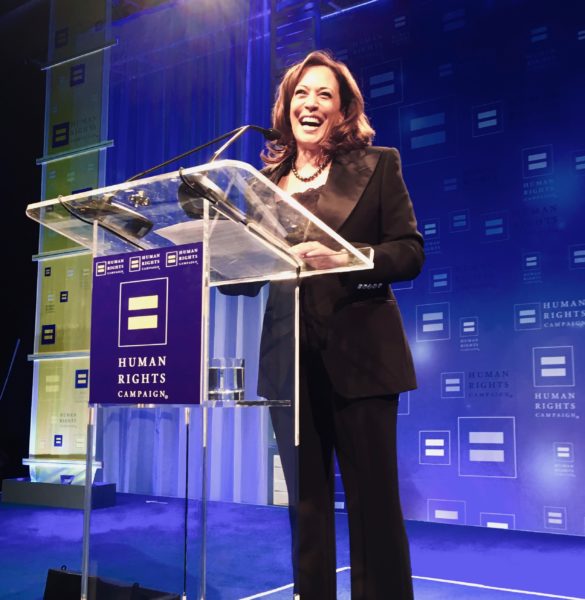
Sen. Kamala Harris at 2019 HRC/LA gala (Photo by Karen Ocamb)
Two years later, at the HRC/LA gala last April, Harris again underscored how the country is at an inflection point and each citizen has a responsibility to respond.
“These last two years and some months have certainly caused a lot of us to start talking to an inanimate object called a television and to shout at that thing,” Harris said, prompting agreeing chuckles from the crowd. “It has caused a lot of us to sign up for individual or group therapy, it has caused a lot of us to feel a lot of despair and depression and anxiety and fear. And I say, ‘Don’t let the bad guys win!’”
Harris also referenced poet Emma Lazarus’ famous quote “Until we are all free, we are none of us free.”
“Let’s pass the Equality Act in the U.S,” she said. “Until all of us are equal, none of us are equal.”
That these are not just “freedom” talking points pulled out for an LGBT gala is illustrated by a funny vignette in her memoir. Harris and her younger sister Maya were raised by her civil rights activist mother Shyamala. At one rally, when Harris was still in a stroller, she starting acting out, being fussy. When her mother asked her what she wanted, toddler Harris said, “Fweedom!”
In 2014, out legal eagle Chris Geidner reported on Harris the “progressive prosecutor” at a Center for American Progress’ Making Progress Policy Conference:
“If there’s a distrust of law enforcement — and, by extension, government — all of the systems break down, at least for certain populations,” she said. “When I charge a case … it’s in the name of the people and the premise there is that a crime against any of us is a crime against all of us. If there are specific communities that are not receiving the full benefit of the protections we created, it’s a problem for all of us.”
Asked about the history of distrust between the black community and law enforcement, Harris said, “It’s all of our responsibilities to acknowledge it and deal with it where it occurs. And it’s not just because it’s the morally right thing to do, I believe it’s in the best interest of public safety for everyone.”
A funny vignette in a lengthy profile of Harris in the May issue of The Atlantic suggests gay people are part of her everyday consciousness, not just called forth when required. It’s a vignette she later talked about on The Daily Show With Trevor Noah.

Screengrab from CNN reporter Maeve Reston’s tweet
Harris and her sister, followed by a slew of journalists, visited Styled by Naida, “a vintage-clothing store run by Naida Rutherford, who grew up in the foster-care system and was homeless before she steadied herself economically by hosting stylish garage sales,” Elizabeth Weil reported.
After picking out a hat and a black belt:
“Harris noticed a brightly colored sequined coat, a chessboard of turquoise, purple, yellow, green, and sky blue. The jacket was just about the furthest fashion choice imaginable from Harris’s standard dark blazer. Still, Rutherford, a good saleswoman, encouraged Harris, a good candidate, to try it on, and Harris did. She looked in the mirror, the horde of journalists to her back. “This really would be perfect for the Pride parade,” she said.
A nice, unguarded human moment. The jacket was way too big, and she’ll almost certainly never wear it anywhere but the parade. But you’d have to be a monster—and a tone-deaf politician—not to want to support Rutherford. Harris bought the coat.”
Kamala (comma-la) Harris was born on Oct. 20, 1964, five years before the Stonewall Rebellion, and never needed an epiphany to discover that LGBT people were OK.
“I grew up in a community and a culture where everyone was accepted for who they were, so there wasn’t a moment where it was like, ‘Okay, now let’s let this person in.’ Everyone was a part of everything. It was about community,” Harris says. “It was about coalition building. It was about equality, inclusion. I mean, I had an uncle who was gay. [But] there was no epiphany” about gay people.
In fact, with the exception of Buttigieg’s very presence, Harris is the only top-tier presidential candidate to constantly reference homophobia and transphobia in her speeches.
But some trans people are still angry over how Harris backed the Department of Corrections in its 2015 denial of gender reassignment surgery for then 51-year-old inmate Michelle-Lael Norsworthy.
The Washington Blade’s Chris Johnson asked Harris about the issue in January at Harris’ first news conference after announcing her 2020 presidential bid.
“I was, as you are rightly pointing out, the attorney general of California for two terms and I had a host of clients that I was obligated to defend and represent and I couldn’t fire my clients, and there are unfortunately situations that occurred where my clients took positions that were contrary to my beliefs,” Harris said.
“And it was an office with a lot of people who would do the work on a daily basis, and do I wish that sometimes they would have personally consulted me before they wrote the things that they wrote?” Harris said. “Yes, I do.”
“But the bottom line is the buck stops with me, and I take full responsibility for what my office did,” Harris said.
Harris confirmed to the Los Angeles Blade that she worked behind the scenes with the California Department of Corrections & Rehabilitation to establish a process enabling transgender inmates to receive transition-related care, including gender reassignment surgery, and she worked on getting Norsworthy paroled.
“I did it quietly, because I actually disagreed with my client initially, when they had the policy, and so I did it behind the scenes,” Harris tells the Los Angeles Blade. “I helped to resolve and change the policy. The issue for me was to make sure the right thing would happen.”
But Harris adds: “Let me just be very clear. I don’t want to take full credit for that, because I don’t deserve full credit for that. I don’t want what I said to be interpreted as that. There were a lot of people involved in that.”
But Harris’ responses have been so cerebral, some feel she doesn’t see the humanity in trans individuals.
“I understand not only their humanity, but I also understand the unfair challenges that they face in a society that still hasn’t come to appreciate their full humanity,” Harris tells the Los Angeles Blade. “And I know the hate that also has been targeted at our transgender friends, and I know that it resulted in lethal proportions. That’s why, when I was the vice president of the National District Attorneys Association, I led the national DAs in a training on the ways that we can get rid of the ‘gay panic defense,’ because I knew it was being used as justification for the killing of many people, including transgender people.”
Transphobia “is something I care deeply about. I have known many people who are transgender, and talked with them and really shared their pain around what their life experience has been like because of the ignorance that still exists about who they are and the challenges they face,” Harris says.
That includes all healthcare concerns.
On Thursday, June 20, Harris introduced the PrEP Access and Coverage Act, legislation to guarantee insurance coverage for PrEP and create a grant program to fund access for uninsured patients.
“PrEP is a critical advancement in the fight against HIV that can finally provide peace of mind to Americans who live in the shadow of the HIV epidemic. But for too many in our country, lack of insurance coverage and exorbitant costs have put PrEP out of reach—and that needs to change. We must truly commit ourselves to HIV prevention by finally requiring every health insurance plan—public and private—to cover PrEP and all of the required tests and follow-up doctors’ visits. We must also provide the resources necessary to help people without insurance access PrEP. Nearly four decades since the beginning of the HIV/AIDS crisis that took so many lives and caused countless others to live in fear, we can and will stop the spread of this disease,” said Harris in a statement.
Harris says that if elected president, she would sign an executive order to protect DREAMers and put them on a path to citizenship. The Los Angeles Blade asked if she would sign an executive order for the Equality Act, the LGBT civil rights bill that would prohibit discrimination against LGBT people in employment, housing and public accommodations.
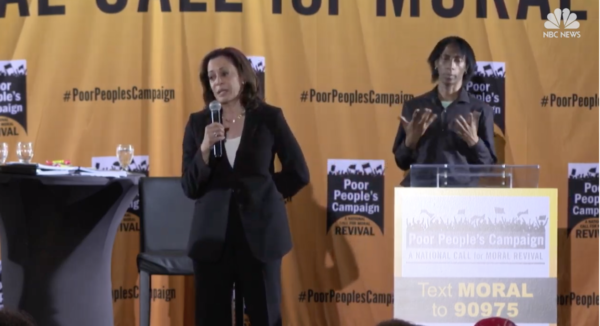
At the recent Poor People’s Campaign forum on poverty, Harris noted her efforts to help LGBT homeless youth in San Francisco. But, other that the Campaign’s leader, Bishop William Barber, LGBT people are being left out of the discussions and debates over the economy, pay equity, and jobs. The last report with research from the Williams Institute, the Center for American Progress and the Movement Advancement Project was in 2015 under President Obama.
The report found that: “Due to discriminatory laws, America’s 5.1 million LGBT women face lower pay, frequent harassment, compromised access to health care, and heightened violence. Anti-LGBT laws, together with inequitable and outdated policies, mean that LGBT women’s economic security is compromised by reduced incomes and added costs ranging from health care to housing.”
“LGBT women face added challenges not solely because of their gender, but also because of who they are and whom they love. Discrimination and stigma, combined with the struggles faced by all women, make LGBT women and their families especially vulnerable,” said Ineke Mushovic, executive director of the Movement Advancement Project.
“Making matters worse, the burden falls most acutely on those who can least afford it: LGBT women raising children, older LGBT women, LGBT women of color, LGBT immigrants, and those LGBT women and families who are already living near or below the poverty line.”
The Equality Act, which has passed in the House, would help counter some of these issues. While Harris did not commit to issuing the legislation as an executive order, she did commit to making it a top priority as president.
“One of my first orders of business would be to get the Equality Act passed,” Harris says. “Listen, I believe in the words and the spirit behind the Constitution of the United States and all of its amendments and those words we spoke in 1776 at the founding of our nation—that we are all equal and should be treated that way. That’s why I fought against Prop 8. I don’t believe that it is reflective of our democracy or the spirit of our founding, that any person would be treated differently under the law.
“So it is for all of those reasons that the Equality Act would be a first order of business for me,” Harris continues, “and to do everything that I can within my power to make sure that we make that point about who we are as a nation. I often look at the words inscribed on that marble at the United States Supreme Court, and it says, ‘Equal Justice Under Law.’ I truly believe that. That is our goal. That is our ideal. That is part of who we are as a nation and we have to fight for that every day.”
Cover photo of Sen. Harris at 2018 Pride parade courtesy Harris’ 2020 presidential campaign.
Breaking News
Trump administration sues California over trans student-athletes
Lawsuit claims state policy violates federal law on school sports
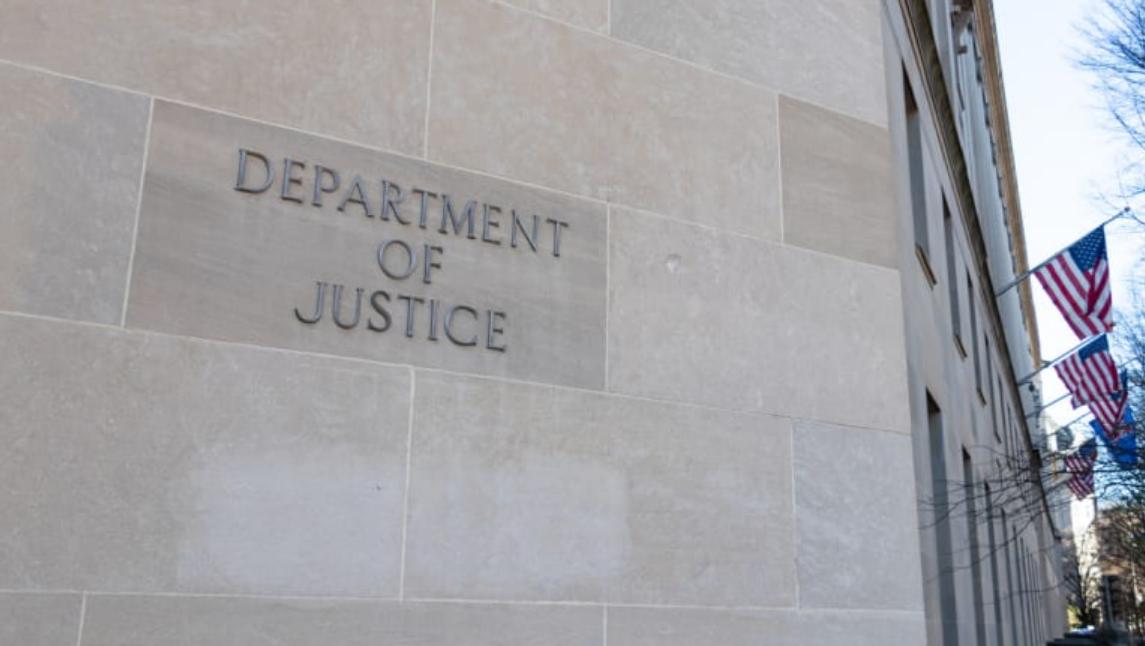
President Donald Trump is making good on his threat to punish California officials for allowing transgender female student-athletes to compete with cisgender girls in school sports.
On Wednesday, the U.S. Department of Justice announced it is suing the state’s Department of Education, claiming California’s policy to allow trans students to compete with other girls violates Title IX, the federal law that bans discrimination in education based on sex. The DOJ’s suit says California’s rules “are not only illegal and unfair but also demeaning, signaling to girls that their opportunities and achievements are secondary to accommodating boys.”
As the Washington Blade reported in June, this lawsuit follows a warning by the Trump administration to end the trans participation policy within 10 days or face referral to the DOJ as well as the loss of federal education funding.
And California may merely be the first to face legal action, according to U.S. Attorney General Pam Bondi, who warned that the 21 other states which permit trans girls to compete in female athletics could also face challenges by the federal government.
“If you do not comply, you’re next,” she said in a video posted on the DOJ website. “We will protect girls in girls sports.” Bondi was joined by Secretary of Education Linda McMahon.
The DOJ suit named California’s Education Department and the California Interscholastic Federation, the governing body for high school sports. A spokesperson for the CIF told the Associated Press the organization would not comment on pending litigation.
A spokesperson for Democratic Gov. Gavin Newsom deferred to the CIF and the Department of Education in declining to comment on the lawsuit since the governor was not named a defendant. But Newsom’s office told the AP that the Trump administration’s attacks on its policies protecting transgender athletes are “a cynical attempt” to distract from the federal government’s withholding of funds for all students who benefit from after-school and summer programs.
Newsom, however, has come under criticism — most notably by the Human Rights Campaign — for remarks he made in March, that allowing transgender athletes to compete in women’s sports was “deeply unfair,” as the Blade reported.
For more than a decade, California law has allowed students to participate in sex-segregated school programs, including on sports teams, and use bathrooms and other facilities that align with their gender identity.
But headlines about AB Hernandez, an out trans female high school student-athlete who won titles in the California track-and-field championships last month, drew condemnations from Assistant U.S. Attorney General Harmeet Dhillon, and President Trump himself.
Following the meet, Dhillon wrote in a letter to the California Interscholastic Federation that it violated the Equal Protection Clause of the Constitution by allowing trans girls to compete against other female athletes.
As for the lawsuit, DOJ claims California’s policies “ignore undeniable biological differences between boys and girls, in favor of an amorphous ’gender identity.’”
“The results of these illegal policies are stark: girls are displaced from podiums, denied awards, and miss out on critical visibility for college scholarships and recognition,” the suit says.
Last week, the U.S. Supreme Court agreed to hear two cases challenging state bans on trans student-athletes, as the Blade reported. More than 20 states have limited trans girls from participating on girls sports teams, barred gender-affirming surgeries for minors and required parents to be notified if a child changes their pronouns at school. More than two dozen states have laws barring trans women and girls from participating in certain sports competitions. Challenges to some of those policies are still being decided by courts across the country.
Back in February, the president signed an executive order that bans trans girls and women from participating in sports that match their gender identity, as the Blade reported.
Supporters of banning trans girls and women from competing include the conservative California Family Council, which has posted a petition online, arguing a ban would restore fairness in athletic competitions. Opponents like Equality California say bans are an attack on transgender youth.
“Local schools and athletic associations are the ones who should be handling these issues, and they are already creating policies that protect transgender youth and ensure a level playing field for all students. A federal ban that overrides those rules could require young girls to answer inappropriate personal questions or even be subjected to genital inspections by strangers if they want to participate in sports,” the organization said in a statement in February.
“The head of the NCAA, himself a former Republican Governor, recently told a U.S. Senate panel that he knew of less than 10 out transgender athletes among the 510,000 currently competing in college sports—less than .002 percent of all NCAA athletes.
“Studies confirm that participation in sports provides kids with invaluable life skills such as teamwork, leadership, discipline, and cooperation—fundamental lessons that every young person deserves the chance to experience. Beyond the field, sports also contribute significantly to students’ overall well-being, fostering better mental health, boosting academic performance, and enhancing self-esteem and confidence.”
Obituary
The queer community mourns the loss of trailblazer Jewel Thais-Williams
Founder of Catch One, Thais-Williams became the first Black woman to own an LGBTQ club in the nation.

Jewel’s Catch One nightclub, affectionately referred to by locals as “The Catch,” has been a vital part of the queer and Black communities since its opening in 1973. It was one of the first Black discos in the US, and the first major Black queer bar in Los Angeles. At its helm was pioneer Jewel Thais-Williams, the first Black woman to own an LGBTQ club in the nation. Jewel passed away on July 7th, as confirmed by her sister Carol Williams; she was 86 years old.
Thais-Williams was born in Gary, Indiana, and was brought to San Diego after her family members were drafted into the Navy and stationed in San Diego. After high school, she attended UCLA. Seeing the limited possibilities available to Black women, she believed the only way to acquire wealth was to open her own business, and she started a dress shop with her sister.
She came into her sexuality in her mid-twenties and identified as a lesbian. She experienced firsthand the discrimination towards Black folk at gay clubs and purchased the Diana Club in the Arlington Heights district. She renamed it Jewel’s Catch One, and made history. At the time, women couldn’t tend bar unless they owned it.
After proving herself to the nightclub community, Catch One became a thriving safe space for the queer and Black communities. It also became a go-to spot for celebrity performers, with Janet Jackson, Donna Summer, Whitney Houston, Rick James, Madonna, and more.
Thais-Williams wasn’t just a bar owner; she was an activist. During the AIDS epidemic, she made Catch One available for community meetings. She also served on the board of the AIDS Project LA, co-founded the Minority AIDS Project, and co-founded Rue’s House, providing a safe space for women with AIDS and their children.
During her reign at Catch One, she went back to school and got a Master of Science degree in Oriental Medicine from Samra University. This inspired her to open the Village Health Foundation, a non-profit with a mission to educate lower-income communities on nutrition and healthy living.
Thais-Williams served as the Grand Marshal for the 2016 Los Angeles Pride Festival. In 2019, the intersection directly in front of Catch One was renamed as Jewel Thais-Williams Square. There have been two documentaries paying homage to Thais-Williams and her club, Jewel and the Catch, and Jewel’s Catch One. Footage from Jewel and the Catch was used in the opening sequence of season 3 of Amazon’s Transparent.
This last weekend, Los Angeles Blade was present at Catch One as it served as host to some of the tentpole events of Los Angeles Blade Pride. Executive Director Brandon Anthony shared this statement with the Blade:
With the devastating news of the passing of Jewel Thais-Williams, we honor a true icon and pioneer whose legacy shaped the soul of Los Angeles. For over 40+ years, she stood as a beacon for the LGBTQ community. CATCH ONE offered refuge during the AIDS epidemic, creating safe spaces when none existed, and championed Los Angeles Black Pride with unwavering love, support, and commitment. Her light made room for all of us to shine, and her legacy will forever live on through the mission of LA Black Pride.
California State Assembly member Rick Chavez Zbur also shared this statement:
I’m deeply saddened by the passing of Jewel Thais-Williams—an icon, a trailblazer, and a matriarch of Los Angeles’ Black LGBTQ+ community. Through Jewel’s Catch One, she created a haven of joy and resistance, and through her advocacy, she brought healing to communities devastated by HIV/AIDS. While leading EQCA, I was honored to present her with our Community Leadership Award in 2018. Her legacy lives on in every life she touched. She will be missed.
Catch One’s Instagram posted:
A celebration of her life at Catch One is anticipated; details to follow.
El Salvador
La marcha LGBTQ+ desafía el silencio en El Salvador
Se realizó el evento en San Salvador bajo la lluvia, pero con orgullo

SAN SALVADOR, El Salvador — El reloj marcaba el mediodía cuando los primeros colores del arcoíris comenzaron a ondear frente a la emblemática Plaza del Divino Salvador del Mundo. A pesar de la incertidumbre generada en redes sociales, donde abundaban los rumores sobre una posible cancelación de la marcha por la diversidad sexual, la ciudad capital comenzaba a llenarse de esperanza, de resistencia y de orgullo.
Este año, la Marcha del Orgullo LGBTQ+ en El Salvador se desarrolló en un contexto tenso, en medio de un clima político que reprime y silencia a las voces disidentes.
“Aunque las estadísticas digan que no existimos, viviendo en El Salvador, un país donde hoy, después de décadas de avances, defender los derechos humanos es de nuevo una causa perseguida, criminalizada y silenciada”, afirmaron representantes de la Federación Salvadoreña LGBTQ+.
A pesar de la cancelación del festival cultural que usualmente acompaña la marcha, los colectivos decidieron seguir adelante con la movilización, priorizando el sentido original de la actividad: salir a las calles para visibilizarse, exigir respeto a sus derechos y recordar a quienes ya no están.
A la 1:30 p.m., una fuerte lluvia comenzó a caer sobre la ciudad. Algunas de las personas presentes corrieron a refugiarse, mientras otras, debajo de sombrillas y de los escasos árboles en la plaza, decidieron mantenerse firmes. Los comentarios pesimistas no se hicieron esperar: “a lo mejor la cancelan por el clima”, “no se ve tanta gente como otros años”. Sin embargo, lo que siguió fue una muestra de resistencia: a las 2:05 p.m. las voces comenzaron a llamar a tomar las calles.
Visibilidad como resistencia
La marcha arrancó bajo una llovizna persistente. La Avenida Roosevelt y la Alameda Juan Pablo II se tiñeron de colores con banderas arcoíris, trans, lésbicas, bisexuales y otras que representan a los diversos sectores de la población LGBTQ+. Cada bandera alzada fue un acto político, cada paso una declaración de existencia.
Desde la Plaza del Divino Salvador del Mundo hasta la Plaza Gerardo Barrios, frente a Catedral Metropolitana y el Palacio Nacional, la marcha se convirtió en un carnaval de dignidad. Carteles con frases como “El amor no se reprime”, “Mi existencia no es delito” o “Marcho por quien ya no puede hacerlo” se alzaron entre las multitudes.
La movilización fue también un espacio para recordar a quienes han perdido la vida por la discriminación y el rechazo. Familias que marcharon por hijos, hijas o amigues que se suicidaron a causa del estigma. Personas que caminaron por quienes aún viven en el miedo, por quienes no pudieron salir del clóset, por quienes se han ido del país huyendo de la violencia.
Arte, fe y rebeldía
Una de las escenas más llamativas fue protagonizada por Nelson Valle, un joven gay que marchó vestido como sacerdote.
“Hay muchas personas que secretamente asisten a ritos religiosos como en Semana Santa, y les gusta vivir en lo oculto. Pero la fe debe ser algo libre porque Dios es amor y es para todos”, dijo.
Valle utilizó su vestimenta como una forma de protesta contra las estructuras religiosas que aún condenan la diversidad sexual.
“Un ejemplo de persona que abrió el diálogo del respeto fue el papa Francisco, abrió la mente y muy adelantado a su tiempo, porque dejó claro que hay que escuchar a toda persona que quiere encontrar a Dios”, agregó.
La marcha también incluyó bandas musicales, grupos de cachiporristas, carrozas artísticas, colectivos provenientes de distintos puntos del país, y manifestaciones de orgullo en todas sus formas. Fue un mosaico cultural que mostró la riqueza y diversidad de la población LGBTQ+ en El Salvador.

Una lucha que persiste
Las organizaciones presentes coincidieron en su mensaje: la lucha por la igualdad y el reconocimiento no se detiene, a pesar de los intentos del Estado por invisibilizarlos.
“Nuestros cuerpos se niegan a ser borrados y a morir en la invisibilidad de registros que no guardan nuestros nombres ni nuestros géneros”, declararon representantes de la Federación.
Además, agregaron: “Desde este país que nos quiere callar, levantamos nuestras voces: ¡La comunidad LGBTIQ+ no se borra! ¡El Salvador también es nuestro! Construyamos, entre todes, un país donde podamos vivir con Orgullo.”
El ambiente fue de respeto, pero también de desconfianza. La presencia de agentes policiales no pasó desapercibida. Aunque no hubo reportes oficiales de violencia, varias personas expresaron su temor por posibles represalias.
“Marchar hoy es también un acto de valentía”, comentó Alejandra, una joven lesbiana que viajó desde Santa Ana para participar. “Pero tenemos derecho a vivir, a amar, a soñar. Y si nos detenemos, les damos la razón a quienes nos quieren ver en silencio.”
Rumbo al futuro
Concluida la marcha frente a Catedral y el Palacio Nacional, muchas personas permanecieron en la plaza compartiendo abrazos, fotos y palabras de aliento. No hubo festival, no hubo escenario, pero hubo algo más valioso: una comunidad que sigue viva, que sigue resistiendo.
Los retos son muchos: falta de leyes de protección y que apoye las identidades de las personas trans, discriminación laboral, violencia por prejuicio, rechazo familiar, y una narrativa estatal que pretende que no existen. Pero la marcha del 28 de junio demostró que, aunque el camino sea cuesta arriba, la dignidad y el orgullo no se borran.
La lucha por un El Salvador más justo, más plural y más inclusivo continúa. En palabras de uno de los carteles más llamativos de ese día: “No estamos aquí para pedir permiso, estamos aquí para recordar que también somos parte de este país”.
Congress
White House finds Calif. violated Title IX by allowing trans athletes in school sports
Education Department threatens ‘imminent enforcement action’

The Trump-Vance administration announced on Wednesday that California’s Interscholastic Federation and Department of Education violated federal Title IX rules for allowing transgender girls to compete in school sports.
In a press release, the U.S. Department of Education’s Office of Civil Rights threatened “imminent enforcement action” including “referral to the U.S. Department of Justice” and the withholding of federal education funding for the state if the parties do not “agree to change these unlawful practices within 10 days.”
The agency specified that to come into compliance; California must enforce a ban excluding transgender student athletes and reclaim any titles, records, and awards they had won.
Federal investigations of the California Interscholastic Federation and the state’s Department of Education were begun in February and April, respectively. The Justice Department sued Maine in April for allowing trans athletes to compete and refusing a similar proposal to certify compliance within 10 days.
Broadly, the Trump-Vance administration’s position is that girls who are made to compete against trans opponents or alongside trans teammates are unfairly disadvantaged, robbed of opportunities like athletics scholarships, and faced with increased risk of injury — constituting actionable claims of unlawful sex discrimination under Title IX.
This marks a major departure from how the previous administration enforced the law. For example, the Department of Education issued new Title IX guidelines in April 2024 that instructed schools and educational institutions covered by the statute to not enforce categorical bans against trans athletes, instead allowing for limited restrictions on eligibility if necessary to ensure fairness or safety at the high school or college level.
Sports aside, under former President Joe Biden the department’s Office of Civil Rights sought to protect against anti-LGBTQ+ discrimination in education, bringing investigations and enforcement actions in cases where school officials might, for example, require trans students to use restrooms and facilities consistent with their birth sex or fail to respond to peer harassment over their gender identity.
Much of the legal reasoning behind the Biden-Harris administration’s positions extended from the 2020 U.S. Supreme Court case Bostock v. Clayton County, which found that sex-based discrimination includes that which is based on sexual orientation or gender identity under Title VII rules covering employment practices.
A number of high profile Democrats, including California Gov. Gavin Newsom, have recently questioned or challenged the party’s position on transgender athletes, as noted in a statement by Education Secretary Linda McMahon included in Wednesday’s announcement.
“Although Gov. Gavin Newsom admitted months ago it was ‘deeply unfair’ to allow men to compete in women’s sports, both the California Department of Education and the California Interscholastic Federation continued as recently as a few weeks ago to allow men to steal female athletes’ well-deserved accolades and to subject them to the indignity of unfair and unsafe competitions.”
News
Drama unfolds for San Diego Pride ahead of festivities
A letter sent to the current Board of Directors earlier this month outlines serious issues like lack of transparency, erosion of SD Pride’s advocacy work and weakening of staff

Over two dozen community leaders, program leaders, current and former volunteers, board members and staff have issued an urgent open letter to San Diego Pride’s board of directors, calling for accountability and transparency from higher leadership, citing patterns of alleged systemic dysfunction.
The letter was sent earlier this month, outlines serious issues, including lack of transparency, erosion of SD Pride’s advocacy work and weakening of staff. Those who have signed the letter are calling for immediate governance reforms, transparent leadership selection processes and an independent audit of the organization’s internal culture.
The letter states: “The current condition of Pride reflects not just instability but a profound crisis in leadership, direction and community trust. The Board’s inaction, lack of transparency and repeated failures of accountability have left the organization weakened, its values compromised and the broader community confused, disappointed and alarmed.”
With three weeks left until the planned festivities, the letter signed by 30 community-based individuals states that the organization is a “hollowed-out” version of what it once was. The letter also states that the identity of the organization has been “blurred”, the staff has been “depleted” and where the “historic commitment to year-round advocacy, inclusion and leadership development” have been abandoned.
The letter highlights the following eight key grievances
- Resignation of fifth Executive Director in under two years
- Unexplained and unannounced departure of senior staff within the past 18 months, including the Director of Education and Advocacy, leaving no plan to sustain or rebuild critical education programs
- Erasing Pride Staff and Board directory from their public website
- The cancellation of She Fest and LGBTQIA+ Survivor Task Force “due to deep misalignment with the current leadership’s values and actions”
- Decline of full-time staff from over 30 full-time employees, to fewer than ten
- Lack of response, dismissiveness, retaliatory behavior and hostility from board members when volunteers, leaders, staff and others bring up concerns
- Non-responsiveness to media inquiries
- Repeated stonewalling
San Diego Pride is also facing other issues with outside sponsors due to the lack of leadership and decision-making within the organization.
Other news outlets have reported that San Diego Pride has lost major sponsors over headlining artist Kehlani and her outspoken support of Palestinians. Harrah’s Resort Southern California, a major financial supporter of the SD Pride Parade, pulled its sponsorship from the upcoming festival, which takes tens of thousands of dollars away from the festivities. Other groups such as University of California, San Diego; and University of California San Diego Health have also withdrawn sponsorship.
A coalition of Jewish organizations decided to boycott the festival and parade, citing safety concerns related to the comments made by Kehlani, citing the music video critics suggest makes a reference to violence against Jewish people.
San Diego Pride issued a statement regarding the sponsors decision to pull support, stating that it “does not endorse or adopt the political positions of any individual performer” and that they honor “the value of artistic integrity, the importance of free expression and the role that artists play in shaping culture, challenging systems and amplifying voices while respecting each other’s differences.”
Kehlani responded to the accusations by stating that they are“not anti-semetic, nor anti-Jew” they are “anti-genocide…anti-extermination of an entire people… anti-bombing of innocent children, men, women,” in a social media video.
Colombia
Colombia avanza hacia la igualdad para personas trans
Fue aprobado en Comisión Primera de la Cámara la Ley Integral Trans

En un hecho histórico para los derechos humanos en Colombia, la Comisión Primera de la Cámara de Representantes aprobó en primer debate el Proyecto de Ley 122 de 2024, conocido como la Ley Integral Trans, que busca garantizar la igualdad efectiva de las personas con identidades de género diversas en el país. Esta iniciativa, impulsada por más de cien organizaciones sociales defensoras de los derechos LGBTQ+, congresistas de la comisión por la Diversidad y personas trans, representa un paso decisivo hacia el reconocimiento pleno de derechos para esta población históricamente marginada.
La Ley Integral Trans propone un marco normativo robusto para enfrentar la discriminación y promover la inclusión. Entre sus principales ejes se destacan el acceso a servicios de salud con enfoque diferencial, el reconocimiento de la identidad de género en todos los ámbitos de la vida, la creación de programas de empleo y educación para personas trans, así como medidas para garantizar el acceso a la justicia y la protección frente a violencias basadas en prejuicios.
Detractores hablan de ‘imposición ideológica
Sin embargo, el avance del proyecto no ha estado exento de polémicas. Algunos sectores conservadores han señalado que la iniciativa representa una “imposición ideológica”. La senadora y precandidata presidencial María Fernanda Cabal anunció públicamente que se opondrá al proyecto de Ley Integral Trans cuando llegue al Senado, argumentando que “todas las personas deben ser tratadas por igual” y que esta propuesta vulneraría un principio constitucional. Estas declaraciones anticipan un debate intenso en las próximas etapas legislativas.
El proyecto también establecelineamientos claros para que las instituciones públicas respeten el nombre y el género con los que las personas trans se identifican, en concordancia con su identidad de género, y contempla procesos de formación y sensibilización en entidades estatales. Además, impulsa políticas públicas en contextos clave como el trabajo, la educación, la cultura y el deporte, promoviendo una vida libre de discriminación y con garantías plenas de participación.
¿Qué sigue para que sea ley?
La Ley aún debe superar varios debates legislativos, incluyendo la plenaria en la Cámara y luego el paso al Senado; pero la sola aprobación en Comisión Primera ya constituye un hito en la lucha por la igualdad y la dignidad de las personas trans en Colombia. En un país donde esta población enfrenta altos niveles de exclusión, violencia y barreras estructurales, este avance legislativo renueva la esperanza de una transformación real.
Desde www.orgullolgbt.co, celebramos este logro, invitamos a unirnos en esta causa impulsándola en los círculos a los que tengamos acceso y reiteramos nuestro compromiso con la visibilidad, los derechos y la vida digna de las personas trans. La #LeyIntegralTrans bautizada “Ley Sara Millerey” en honor de la mujer trans recientemente asesinada en Bello, Antioquia (ver más aquí); no es solo una propuesta normativa: es un acto de justicia que busca asegurar condiciones reales para que todas las personas puedan vivir con libertad, seguridad y respeto por su identidad.
Health
APLA opens eighth location in LA County
The WeHo location is named after Dr. Michael Gottlieb, the groundbreaking physician and researcher who in 1981 co-authored the first medical report identifying AIDS

The Michael Gottlieb Health Center is latest APLA facility to open, making it the eighth location in L.A. County to offer accessible healthcare services.
APLA Health recently opened its brand new the Michael Gottlieb Health Center in West Hollywood with a glitzy ribbon-cutting featuring a bevy of local politicians and community leaders on Friday, June 13. The new location, APLA’ eighth facility, will help the organization provide dedicated LGBTQ-inclusive health services to its more than 22,000 patients.
The new health center boasts 10 exam rooms offering primary, HIV and sexual health care, as well as mental health services. It also includes APLA’s first pharmacy and headquarters for the Alliance for Housing and Healing.
The WeHo location is named after Dr. Michael Gottlieb, the groundbreaking physician and
researcher who in 1981 co-authored the first medical report identifying the illness that
would later become known as AIDS. He later spearheaded important research on the
progression and treatment of HIV/AIDS and co-founded the American Foundation for
AIDS Research. He spent the last four years of his career at APLA, retiring in 2023.
“I’m honored to help dedicate this health center with my name on it,” Gottlieb told a
packed audience in the new center’s waiting room. “The center is named for someone
who is not of the community, but I’m proud to have my name up there, and grateful for a
community that has confided in me and trusted in me for decades now, and I continue
to stand with you in these difficult times in all the issues you’re facing.”
All of the speakers at the opening ceremony noted the difficult political climate for queer
people, immigrants, and health care under the new Trump administration in Washington.
APLA has already been forced to lay off its PrEP Navigation Team from its
Baldwin Hills location, as the federal government has terminated all contracts on HIV
and STD prevention with providers in LA County.
West Hollywood Mayor Chelsea Byers says this moment is an opportunity for the
community to come together to build a strong response.
“We have this opportunity to understand what we are able to do as a local community
against the backdrop of an administration like you had in the 80s,” said Byers. “I wasn’t totally there that whole time. But this link between past experience and present moment is really critical. It’s heartening to see so many community leaders. It’s a really amazing moment we have as a community. At a time when care is needed to be extended to more than ever
before I’m grateful to APLA for making such a beautiful space where care can shine so
bright in our city.”
U.S. Rep. Laura Friedman (CA-30) agreed with that sentiment.
“We have seen this administration deliberately demonize members of our community.
They have demonized immigrants, minorities, our trans community members. They’ve
turned their back on the LGBT community, cruelly cutting funding for AIDS prevention
and STDs. And yet, coming into West Hollywood and this community, and into this
room, we see there’s a tremendous amount of caring and love,” said Friedman. “That is
how we change things in this country, by living those values every day.”
“At a time when the federal government is no longer a partner in anything medical, this
facility is going to provide an incredible and needed safety net for patients,” she said.
Despite these threats, APLA Health CEO Craig Thompson says the organization is
committed to serving everyone who needs care.
“The need for people for health care is going to continue regardless of what the federal
government does around funding, and we’re committed to being there to provide that
health care in all the different ways we possibly can,” he says.
One of the new ways APLA’s new facility will improve service to its patients is through
its new in-house pharmacy.
In addition to fostering closer connection between a patient’s doctor and pharmacist, APLA will offer free delivery at no charge to patients and will help consolidate prescriptions to make it easier for patients to receive and take their medicine.
“We’ve been wanting to close the loop on comprehensive care and offer a pharmacy for
our patients, that way they can get all the support withing one organization,” says Rich
Kowalski, APLA director of pharmacy.
Arts & Entertainment
King of Drag competition series hosts premiere party in West Hollywood
Tune in to see history in the making with TV’s first-ever drag king competition show, King of Drag every Sunday on RevryTV

“King of Drag” hosted its premiere at Beaches Tropicana in West Hollywood on Sunday, June 22, uniting kings from all across the land, far and near.
The TV reality show premiere brought in a packed house with guest appearances, famous drag kings in their full regalia and guests who were more than eager to see the first episode in the historic series.
The series was created by Damian Pelliccione and Christopher J. Rodriguez and hosted by Murray Hill, who bring together a significantly underrepresented group of performers from all across the United States for a competition show on more than just looks and their ability to beat their faces. This diverse group of kings represent various cultures, inspire different communities and bring their unique skills and personalities to compete against each other for the title of king.
And the 10 kings are:
Buck Wyld from Dallas, Texas
Alexander the Great from Austin, Texas
Perka $exxx from Charlotte, North Carolina
Pressure K from Atlanta, Georgia
Dick Von Dyke from Minneapolis, Minnesota
King Molasses from Washington D.C.
Charles Galin King from Los Angeles, California
Tuna Melt from Queens, New York
Henlo Bullfrog from Philadelphia, Pennsylvania
Big D from Bellingham, Washington
The prizes
Crown and scepter from Fierce! Drag Jewels
Custom suit courtesy of Sharpe Suiting
Talent Management from Queer Up Agency
Round-trip flight to Seattle to headline the Emerald City King’s Ball
One year’s worth of e.l.f cosmetics and e.l.f skin products
$10,000 in cash
Kings Court
The battle for king has to be judged by the first and foremost kings, queens and icons of all the land. The Kings Court was made up of Tenderoni, the Puerto Rican King of Charisma,;
Sasha Velour, Brooklyn drag icon, author of “The Big Reveal,” and winner of RuPaul’s Drag Race; Wang Newton, from New York City; legendary director Paul Feig and last, but not least, executive producer and judge of the GLAAD award-winning series “Drag Latina,” and queer style icon, Damian Pelliccione.
Episode One
The first episode’s theme was none other than: sports.
The first challenge was “The Weenie Challenge,” where contestants had to pose for player cards, with only five minutes to suit up in semi-used sports gear. The photoshoot was judged by Chicago-based king Tenderoni and WNBA all-star Layshia Clarendon.
The second challenge brought teams together to write and record a verse, while also coming up with the choreography for a performance. The teams assembled and got to planning — prizes all in mind.
Tuna Melt (Teo Pactong) became the first king to be eliminated from the competition in the series premiere episode. Pactong, who runs the Hause of Melt, a production brand — was voted off after a singing and dancing competition and sports photoshoot during the first episode.
Pactong has been doing drag for four years after being introduced to drag by their drag father Theydy Bedbug. Before doing drag, they held music industry positions at Youtube Music and Google.
In the episode, Pactong opens up about their identities.
Pactong says that in the process of finding their drag king persona Tuna Melt, they found Theo. In their cameo, they explain that when they came out as trans, they didn’t feel like they fit in the world of music tech anymore.
“For the longest time, I never felt like a girl and I also never felt a hundred percent a man,” said Pactong. “It’s always been this spectrum of existence.” When Pactong was put up for elimination, they also opened up about their family background and how that influences their passion for this competition.
“I’m Asian, I’m Latin [American], I’m transgender. I come from a family of immigrants.” they said. “My mother instilled in me that I had to work two times harder than everybody else.”
In the first round of eliminations, it was Henlo Bullfrog and Tuna Melt who ended up in the bottom two, facing off against each other in a final redemption round.
Each week the kings will fight for a last chance during “The Final Thrust” round, and this time it was a breakdancing battle.
In the end, it was Tuna Melt who was voted off by the majority of the Kings Court.
Each week, we will be interviewing the kings as they get eliminated. Stay tuned for more!
Where To Watch
King of Drag is now available to stream on RevryTV, an LGBTQ streaming platform for queer movies, TV shows, music and more — all for free. New King of Drag episodes will premiere weekly on Sundays.
Congress
Garcia elected top Democrat on the House Oversight Committee
Gay Calif. lawmaker vows to hold Trump-Vance administration accountable

U.S. Rep. Robert Garcia (D-Calif.) on Tuesday was elected top Democrat on the House Oversight Committee in a vote that signaled the conference’s overwhelming support for a newer voice on Capitol Hill who will play a key role taking on President Donald Trump.
With a margin of 150-63, the 47-year-old openly gay congressman defeated U.S. Rep. Stephen Lynch (D-Mass.), alongside U.S. Reps. Jasmine Crockett (D-Texas) and Kweisi Mfume (D-Md.) who exited the race after the House Democratic Steering and Policy Committee backed Garcia.
Serving only since 2023, the congressman has had a remarkably quick ascent leading up to his election this week as ranking member of one of the most powerful House committees, awarded a leadership position serving under House Democratic Whip Katherine Clark (Mass.) and selected as a co-chair of former Vice President Kamala Harris’s 2024 presidential campaign.
Democratic members began jockeying for the top seat on the oversight committee this spring after the late-U.S. Rep. Gerry Connolly of Virginia stepped away amid news that his esophageal cancer had returned. He died in May.
Connolly last year fended off a challenge from one of the most well known House Democrats, U.S. Rep. Alexandria Ocasio-Cortez (N.Y.), though with a narrower margin that signaled intra-party tensions over whether leadership roles should still be awarded based on seniority.
Garcia positioned himself as a bridge between the two camps — a consensus candidate with executive managerial experience as the former mayor of Long Beach. At the same time, particularly since the start of Trump’s second term, the congressman has emerged as one of the most outspoken critics of the new Republican regime.
In a statement on X Tuesday, Garcia thanked his colleagues and promised to “hold Donald Trump and his administration accountable.”
I'm honored to have been elected by @HouseDemocrats to serve as Ranking Member on @OversightDems.
— Congressman Robert Garcia (@RepRobertGarcia) June 24, 2025
We will hold Donald Trump and his Administration accountable for their corruption – and work to make our government more effective for the American people.
Let's get to work.
If Democrats win control of the House next year, the oversight committee will be able to exercise powers that are now available only to Republicans under the chair, U.S. Rep. James Comer (R-Ky.), which include the authority to investigate virtually any matter across the federal government, to issue subpoenas, and to compel testimony.
In the meantime, Garcia on Monday promised that Democrats on the committee would “vigorously fight” Republican Speaker Mike Johnson’s (La.) plans “to dismantle the Government Accountability Office.”
News
Getty Center opens new exhibitions on queer history
The exhibition brings together over 270 works that include queer vintage prints, books, magazines and even the latest trend in photography
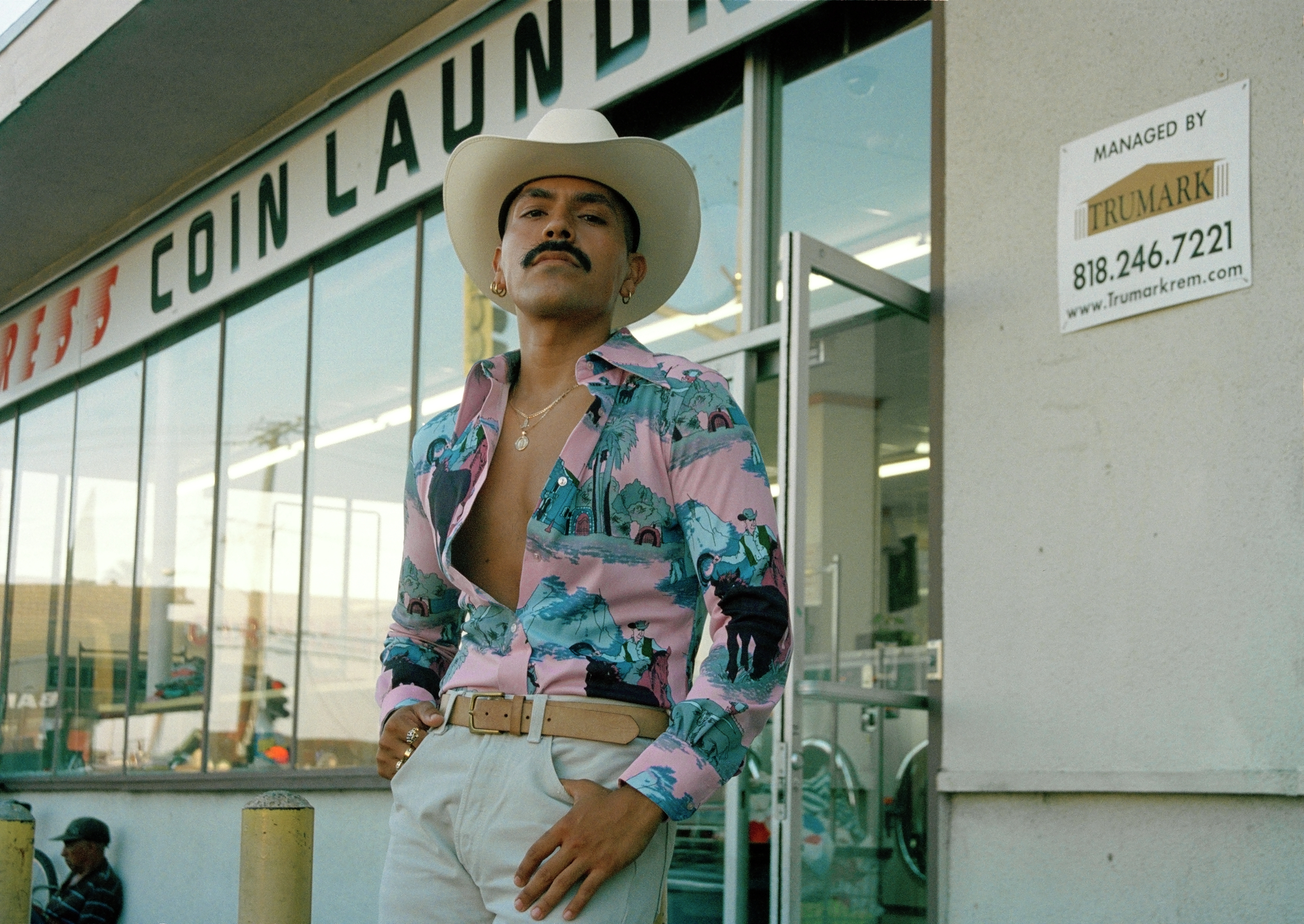
This Pride month, the Getty Center has opened two new photography exhibitions that highlight queer and trans history in moments, glimpses and memories frozen in time.
“Queer Lens: A History of Photography” and “$3 Bill: Evidence of Queer Lives” are now open to the public at the Getty Center in Los Angeles from now through September 28.
“Queer Lens”, the featured exhibition curated by Paul Martineau, features photography prints that span two centuries, capturing LGBTQ life through various lenses and perspectives.
“‘Queer Lens’ takes a theme that is often hidden and gives it a high level of visibility,” said Timothy Potts, the Maria Hummer-Tuttle and Robert Tuttle Director of the J. Paul Getty Museum. “The exhibition explores how, despite multiple forms of discrimination, LGBTQ+ individuals have shaped art and culture in innumerable ways, and how photography was and continues to be a powerful tool in the representation of the queer experience.”
The exhibition brings together over 270 works that include vintage prints, books, magazines and even the latest trend in photography — portraits created using Artificial Intelligence. The exhibition highlights photography’s unique role in preserving the lives and experiences of queer and trans people from the 19th century to present day.
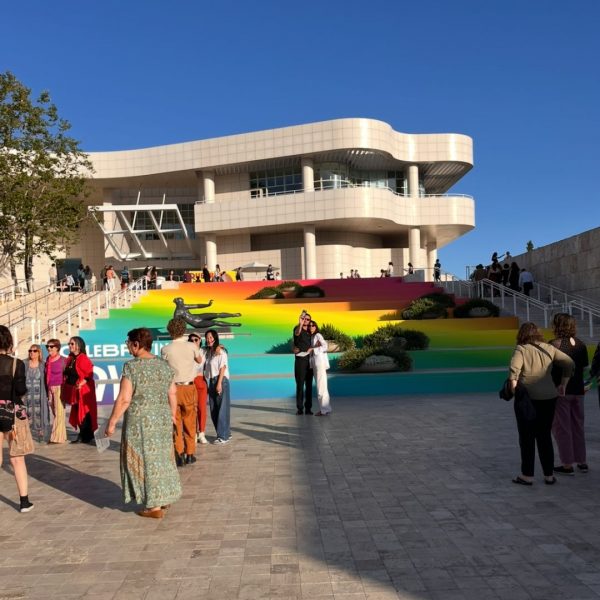
Guests take photos at the opening reception of “Queer Lens” and “$3 Bill” at the Getty Center on Monday, June 16, 2025.
(Photo credit Gisselle Palomera)
“Queer Lens” features eight chronological sections that shape, trace and highlight the dynamic intersection of LGBTQ life and image creation during pivotal moments in history such as the AIDS crisis, the rise of the Gay Liberation Movement and many other historical moments.
The eight sections are titled: “Homosocial Culture and Romantic Relationships”, “Language and Identity”, “The Pansy Craze”, “Hiding in Plain Sight”, “Rise of the Gay Liberation Movement”, “The AIDS Crisis”, “Friends of Dorothy”, “Things are Queer” and “The Future is Queer”.
The exhibition was designed to take viewers on a journey through not only time and space, but also through the struggles and tribulations that queer photographers and their queer subjects had to endure throughout centuries. Many of the subjects in the photos placed in the exhibition have their faces covered, or have been posed in a way that purposely hides their identities during a time where it was illegal and unacceptable to be queer or trans. Many of the earlier photographs also have other clever forms of concealing the identity of their subjects by either using makeup, double exposures, layered media or other creative processes.
“$3 Bill: Evidence of Queer Lives” celebrates the contributions of LGBTQ artists from the past century through an exhibition highlighting the journey of resilience, pride and power. This exhibition is meant to openly acknowledge the complex history of the word “queer” and the reclamation of the word by and for the LGBTQ community. The goal here is to offer and embrace a different, more empowering context of the word.
Viewers are meant to understand the historical moments in the photographs and the journey that queer and trans people have taken throughout time to get to where we are now. Though it is still not illegal here in the U.S. to be queer or trans, we are now again facing moments and events that feel eerily similar to many of those historical moments immortalized in the exhibition. Those moments drove queer and trans ancestors to revolutionize and to take matters into their own hands to make change happen.
The exhibitions will be open throughout summer and are both offered in English and Spanish.
Along with the exhibitions, the Getty Center will also be hosting film screenings of “The Watermelon Woman” and “Tongues Untied”, as well as conversations on Ancient Greek Homoeroticism and Modern Queer Beauty, and an Artists POV conversation by queer, LA-based photographers.
For more information on the events or exhibitions, visit the Getty Center’s homepage.
-

 Breaking News4 days ago
Breaking News4 days agoProject Angel Food loses $340,000 grant to feed people living with HIV
-

 COMMENTARY3 days ago
COMMENTARY3 days agoWhat if doctors could deny you insulin for being gay?
-

 Commentary24 hours ago
Commentary24 hours agoThe Supreme Court’s ‘Don’t Read Gay’ ruling
-

 Opinions4 days ago
Opinions4 days agoThe psychology of a queer Trump supporter: Navigating identity, ideology, and internal conflict
-

 Breaking News4 days ago
Breaking News4 days agoTrump administration sues California over trans student-athletes
-

 Living4 days ago
Living4 days agoFaithfully queer: Finding God and growth in Modern Orthodoxy
-

 a&e features1 day ago
a&e features1 day agoThe art of controlled chaos: Patrick Bristow brings the Puppets to life





